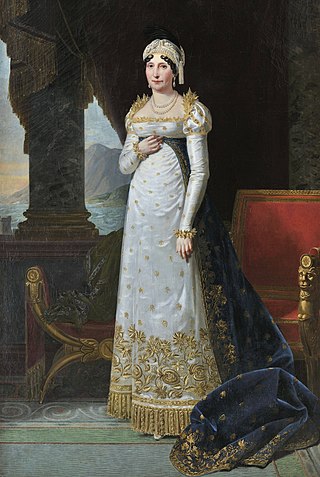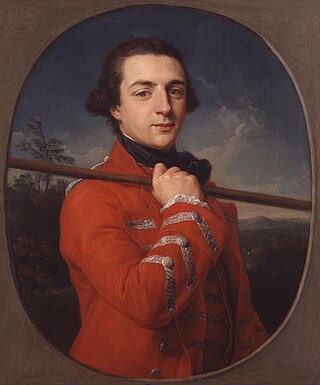
Ajaccio is the capital and largest city of Corsica, France. It forms a French commune, prefecture of the department of Corse-du-Sud, and head office of the Collectivité territoriale de Corse. It is also the largest settlement on the island. Ajaccio is located on the west coast of the island of Corsica, 210 nautical miles (390 km) southeast of Marseille.

Filippo Antonio Pasquale de' Paoli was a Corsican patriot, statesman, and military leader who was at the forefront of resistance movements against the Genoese and later French rule over the island. He became the President of the Executive Council of the General Diet of the People of Corsica and wrote the Constitution of the state.

Carlo Maria Buonaparte or Charles-Marie Bonaparte was a Corsican attorney best known as the father of Napoleon Bonaparte and grandfather of Napoleon III.

The first Corsican Constitution was drawn up in 1755 for the short-lived Corsican Republic independent from Genoa beginning in 1755, and remained in force until the annexation of Corsica by France in 1769. It was written in Tuscan Italian, the language of elite culture and people in Corsica at the time.

Maria-Letizia Bonaparte, known as Letizia Bonaparte, was a Corsican noblewoman and the mother of Napoleon I of France. She received the title "Madame Mère" due to her status as the Emperor's mother.

Corsica is an island in the Mediterranean Sea and one of the 18 regions of France. It is the fourth-largest island in the Mediterranean and lies southeast of the French mainland, west of the Italian Peninsula and immediately north of the Italian island of Sardinia, the nearest land mass. A single chain of mountains makes up two-thirds of the island. As of January 2024, it had a population of 355,528.

The Battle of Ponte Novu took place on May 8 and 9, 1769 between royal French forces under the Comte de Vaux, a seasoned professional soldier with an expert on mountain warfare on his staff, and the native Corsicans under Carlo Salicetti. It was the battle that effectively ended the fourteen-year-old Corsican Republic and opened the way to annexation by France the following year.

The history of Corsica goes back to antiquity, and was known to Herodotus, who described Phoenician habitation in the 6th century BCE. Etruscans and Carthaginians expelled the Phoenicians, and remained until the Romans arrived during the Punic Wars in 237 BCE. Vandals occupied it in 430 CE, followed by the Byzantine Empire a century later.

Italian irredentism in Corsica was a cultural and historical movement promoted by Italians and by people from Corsica who identified themselves as part of Italy rather than France, and promoted the Italian annexation of the island.

The Corsican Republic was a short-lived state on the island of Corsica in the Mediterranean Sea. It was proclaimed in July 1755 by Pasquale Paoli, who was seeking independence from the Republic of Genoa. Paoli created the Corsican Constitution, which was the first constitution written in the Italian language. The text included various Enlightenment principles, including female suffrage, later revoked by the Kingdom of France when the island was taken over in 1769. The republic created an administration and justice system, and founded an army.

The flag of Corsica was adopted by General of the Nation Pasquale Paoli in 1755 and was based on a traditional flag used previously. It portrays a Moor's head in black wearing a white bandana above his eyes on a white background. Previously, the bandana covered his eyes; Paoli wanted the bandana moved to above the eyes to symbolize the liberation of the Corsican people from the Genoese.

The Anglo-Corsican Kingdom, also known officially as the Kingdom of Corsica, was a client state of the Kingdom of Great Britain that existed on the island of Corsica between 1794 and 1796, during the French Revolutionary Wars.

The Treaty of Versailles was a treaty concluded on 15 May 1768 at Versailles between the Republic of Genoa and France, in which Genoa ceded Corsica to France.

The Genoese towers in Corsica are a series of coastal defences constructed by the Republic of Genoa between 1530 and 1620 to stem the attacks by Barbary pirates.

The Kingdom of Corsica was a short-lived kingdom on the island of Corsica. It was formed after the islanders crowned the German adventurer Theodor Stephan Freiherr von Neuhoff as King of Corsica.

The Corsican Crisis was an event in British politics during 1768–69. It was precipitated by the invasion of the island of Corsica by France. The British government under the Duke of Grafton failed to intervene, for which it was widely criticised and was one of many factors that contributed to its downfall in early 1770.

Corsican nationalism is the concept of a cohesive nation of Corsica and a national identity of its people. The Corsican autonomy movement stems from Corsican nationalism and advocates for further autonomy for the island, if not outright independence from France.

Jacques Pierre Abbatucci was a Corsican who became an officer in the army of Genoese Corsica, Ancien regime France and the First French Republic.

The invasion of Corsica was a campaign fought in the spring and summer of 1794 by combined British military and Corsican irregular forces against a French garrison, early in the French Revolutionary Wars. The campaign centred on sieges of three principal towns in Northern Corsica; San Fiorenzo, Bastia and Calvi, which were in turn surrounded, besieged and bombarded until by August 1794 French forces had been driven from the island entirely.

The French expedition to Sardinia was a short military campaign fought in 1793 in the Mediterranean Sea in the first year of the War of the First Coalition, during the French Revolutionary Wars. The operation was the first offensive by the new French Republic in the Mediterranean during the conflict, and was directed at the island of Sardinia, part of the Kingdom of Sardinia. Sardinia was neutral at the time, but immediately joined the anti-French coalition. The operation was a failure, with attacks directed at Cagliari in the south and La Maddalena in the north both ending in defeat.


















